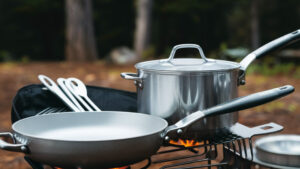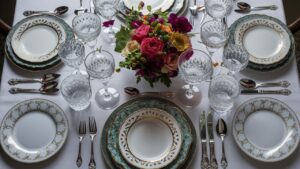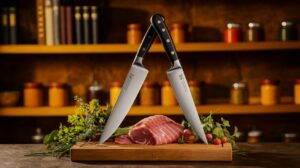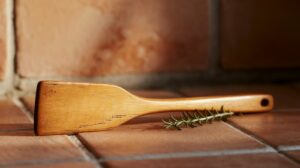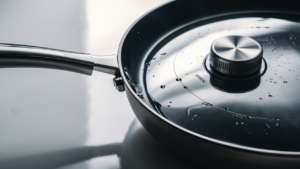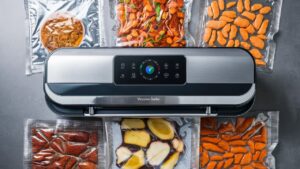Yes, a Dutch oven is worth it for its versatility and durability. It excels in braising, baking, and slow cooking, making it an essential kitchen tool.
A Dutch oven is a heavy-duty pot made from cast iron or enameled cast iron. Its design allows for excellent heat retention and even cooking, making it perfect for a wide range of dishes. From hearty stews to crusty breads, this cookware can handle it all.
The tight-fitting lid traps moisture, enhancing flavors and keeping food juicy. While it may require a higher initial investment, its longevity and performance justify the cost. Home cooks who appreciate versatility and quality will find a Dutch oven a valuable addition to their kitchen arsenal. Whether you’re a novice or a seasoned chef, this pot can elevate your cooking game.
The Dutch Oven: A Culinary Staple
The Dutch oven has a rich history that dates back centuries. Originally made from cast iron, these pots were designed for slow cooking and stewing. Their heavy construction allows for even heat distribution, making them perfect for various cooking methods.
Modern Dutch ovens often feature enameled finishes. This design prevents rusting and allows for easy cleaning. The tight-fitting lid helps to trap steam, ensuring that food retains its moisture. This results in flavorful and juicy dishes that delight the palate.
| Material | Benefits |
|---|---|
| Cast Iron | Excellent heat retention and even cooking |
| Enameled Cast Iron | Easy to clean and prevents rust |
| Stainless Steel | Durable and resistant to stains |
Versatility In The Kitchen
A Dutch oven is incredibly versatile in the kitchen. It can handle various cooking methods with ease. From hearty stews to freshly baked breads, it shines in every task.
Stews come out tender and flavorful thanks to the tight-fitting lid that traps steam. This method helps in slow cooking, making meals rich and delicious. Baking bread in a Dutch oven creates a perfect crust, sealing in moisture.
Outdoor cooking benefits greatly from a Dutch oven. It can be used over an open flame or on a camp stove. This adaptability allows for cooking soup, chili, or even casseroles outside.
In summary, a Dutch oven is an excellent tool for any home cook. Its ability to perform multiple functions makes it a wise investment.
Heat Retention And Distribution
Heat retention and distribution are two key features of a Dutch oven. This cookware maintains consistent temperatures, which is perfect for various cooking methods. The heavy construction allows for even cooking, reducing the risk of hot spots.
Cooking at consistent temperatures helps achieve better results. Dishes turn out more flavorful and evenly cooked. A Dutch oven is excellent for braising, stews, and baking.
Another advantage is its ability to lock in moisture and flavor. The tight-fitting lid traps steam, keeping food juicy and delicious. This makes it ideal for slow-cooked meals that need time to develop rich flavors.
Size And Capacity Considerations
Choosing the right size Dutch oven is crucial for your cooking needs. Consider your typical meal sizes. A smaller Dutch oven is perfect for simple dishes or side items. Larger models suit family meals or batch cooking.
For batch cooking and meal prep, opt for a bigger capacity. This allows you to prepare multiple servings at once. A larger Dutch oven can handle soups, stews, and casseroles efficiently. Make sure the size fits your storage space, too.
| Size | Ideal Use |
|---|---|
| 3-5 quarts | Small meals, side dishes |
| 6-7 quarts | Family meals, batch cooking |
| 8+ quarts | Large gatherings, soups |
Price Points And Value
Dutch ovens come in a range of prices. Budget options usually cost between $30 and $70. These are great for occasional use. Premium brands like Le Creuset can cost $300 or more. They offer better durability and performance.
Consider the cost-per-use when evaluating value. A high-quality Dutch oven may seem expensive at first. However, if used frequently, the cost spreads out over time. For instance, cooking multiple meals per week makes it a practical investment.
Here’s a quick comparison:
| Type | Price Range | Durability |
|---|---|---|
| Budget | $30 – $70 | Good |
| Premium | $300+ | Excellent |

Durability And Longevity
A Dutch oven is known for its durability and longevity. These pots can last for generations when cared for properly. Made from heavy cast iron, they can withstand high temperatures and resist warping. The enamel coating helps prevent rust and makes cleaning easier.
Proper maintenance is essential. Always let the pot cool before washing it. Avoid using sharp utensils that can scratch the surface. Regularly season the cast iron to maintain its non-stick properties. Using a gentle cleaner ensures the pot remains in top shape.
With the right care, a Dutch oven becomes a trusted kitchen companion. Its ability to cook evenly makes it a favorite for many recipes. Investing in a high-quality Dutch oven pays off in the long run.
Comparisons To Other Cookware
A Dutch oven and a stockpot serve different purposes in cooking. A Dutch oven excels at slow cooking, braising, and baking. Its thick walls retain heat and moisture, making dishes tender and flavorful.
On the other hand, a stockpot is ideal for boiling and cooking large batches of soup or stock. It has a tall, narrow shape that helps cook food quickly. For specific dishes, like stews or casseroles, the Dutch oven is the preferred choice.
| Feature | Dutch Oven | Stockpot |
|---|---|---|
| Best Use | Slow cooking, baking | Boiling, large batches |
| Heat Retention | Excellent | Good |
| Shape | Short and wide | Tall and narrow |
Real User Experiences
Many users rave about their Dutch ovens. They find them perfect for slow cooking and baking. One user mentioned that their meats come out tender and juicy. Another praised its versatility for stews, casseroles, and even deep-frying.
Common misconceptions exist about these cooking tools. Some believe they are only for low and slow cooking. In reality, they can also handle high heat. Others think they are too heavy to use. While they are sturdy, many find them easy to manage.
Reviews highlight how a Dutch oven enhances the flavor of meals. The tight-fitting lid keeps moisture in, resulting in delicious dishes. Users say they are worth the investment for any home cook.
Making The Decision
Assessing your cooking needs is crucial before purchasing a Dutch oven. These versatile pots are great for braising, stews, and even baking bread. Their ability to retain heat makes them special for slow cooking. Consider how often you cook meals that require these methods.
A Dutch oven can be an essential investment if you love cooking at home. They perform well in various cooking techniques, from sautéing to deep-frying. If you enjoy creating delicious one-pot meals, this cookware is a great addition.
Evaluate your budget and cooking style. A high-quality Dutch oven can last for years, making it a wise choice. Investing in a good one means fewer replacements and more satisfying meals.
Care And Maintenance Tips
Proper cleaning is essential for maintaining your Dutch oven. Always allow it to cool down before washing. Use warm, soapy water with a soft sponge. Avoid harsh scouring pads that can scratch the surface. Rinse thoroughly and dry immediately to prevent rust.
Avoiding common mistakes will extend the life of your Dutch oven. Never put a hot pot directly into cold water. This can cause cracks. Using sharp utensils can damage the interior. Citrus-based cleansers can harm the finish, so stick to mild soaps.
For deep frying, do not overfill the pot with oil. Always use a medium heat to prevent damage. Lastly, avoid cooking in a dry pan, as this can lead to food sticking and burning.
Frequently Asked Questions
What Is So Special About A Dutch Oven?
A Dutch oven is special due to its heat retention and moisture-trapping lid. It excels in various cooking methods, including braising, baking, and frying. This versatile cookware promotes flavorful, juicy dishes, making it a valuable addition to any kitchen. Its durability ensures long-lasting performance.
Is It Worth Investing In Dutch Oven?
Investing in a Dutch oven is worth it. This versatile cookware excels at braising, baking, and simmering. It retains heat well, ensuring flavorful dishes. A quality Dutch oven lasts for years, making it a smart addition to any kitchen. Enjoy the enhanced cooking experience it provides.
Does Using A Dutch Oven Make A Difference?
Using a Dutch oven significantly enhances cooking. Its heat retention ensures even cooking, while the tight lid traps moisture for flavorful, juicy dishes. Ideal for braising, stewing, and baking, it offers versatility unmatched by other cookware. Investing in a quality Dutch oven pays off in delicious results.
When Should You Not Use A Dutch Oven?
Avoid using a Dutch oven in the microwave or on high-heat burners. Don’t place hot cookware in cold water. Refrain from using sharp utensils or abrasive cleaners. Never cook in a dry pan or overfill with oil for frying. These practices can damage the oven.
Conclusion
A Dutch oven is more than just a cooking pot; it’s a versatile kitchen essential. From braising to baking, its heat retention enhances flavors and textures. Investing in a high-quality Dutch oven can elevate your culinary skills and simplify meal preparation.
Consider your cooking habits, and you may find it worth every penny.
